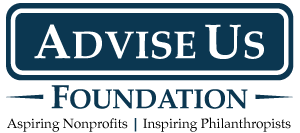
by Andrew Hibel | Dec 1, 2015 | #GivingTuesday, Donor Impact, Donor-Advised Funds |
As founder of The Advise Us Fund, I recognize the power of giving. Since starting this nonprofit organization, I’ve seen firsthand that philanthropy makes our communities stronger by helping those in need and supporting causes that are closest to our hearts. We are all motivated by these passions, and The Advise Us Fund is how I exhibit what’s closest to my heart: philanthropy. Giving Tuesday is an opportunity for us all to be called into action and give back to our communities. We do so by giving to the philanthropic causes that make a difference in our lives. As a founder of a charity that serves other charities and causes, I find it fulfilling to see the act of giving recognized. Without it, no charity would exist. If you are involved in making charities thrive, whether by supporting them, guiding gift-giving clients, or stewarding the organizations, take time today to reflect and give thanks for giving and our culture of giving. TO DONORS who are thinking about your giving, take advantage of our Charity Navigator search feature on our evaluate charities page. Or go directly to Charity Navigator or GuideStar to review the charities you are considering to support. It is worth the time to know more about what you are supporting as there are lots of choices and limited resources. TO FINANCIAL PROFESSIONALS, please know that your role in the philanthropic world is essential. The tools available to donors today are the most sophisticated and complex we have ever seen. Your guidance and stewardship of your client’s giving spirit often provides the spark that makes...

by Andrew Hibel | Sep 18, 2015 | Donor Impact, Donor-Advised Funds, Featured |
Most likely you should start now. Your children or grandchildren, as young as three years old, have started learning to share. Charity is another form of sharing. As Bruce DeBoskey recently pointed out, “Even three-year-olds can be encouraged to select and donate gently used items like clothes, books and toys to children with less. When they assist in delivering these items, they will see how their donations actually help others.” Sharing age-appropriate giving experiences with children or grandchildren is sharing a beautiful and joyful experience with them. You’re teaching them what makes you happy and fulfilled. You’re also leaving them with a legacy of what will make them happy and fulfilled too. As children get older, pre-teen or teen, they increase their capacity for giving and understanding. Their charitable opportunities also increase. Volunteering opportunities can develop greater empathy. Having a greater say in family giving – both choosing charities and choosing amounts – offer an important next step in their development. Pre-teen and teen children can better appreciate what they have through charity. They learn more about what others, not always as fortunate, have too. Through charitable giving teens can develop social skills, business skills and greater capacity for judgment. Consider opening a charitable account with teen children or grandchildren. Charitable accounts like donor-advised funds, supervised by a parent or guardian, offer further opportunities for growth and greater responsibility. As children become adults they may have particular interests in philanthropy. Pursuing charitable interests can develop lifelong connections and skills. They also offer opportunities for family members to connect and share common values. Charitable giving offers happiness, fulfillment and a...

by Andrew Hibel | Aug 27, 2015 | Donor Intent, Donor-Advised Funds, Featured |
Don’t have time now? Do it later. Something came up and you want to give now? Go ahead. Do you have a foundation or a charitable trust and want additional flexibility? You can have it. Donor-advised funds offer donors like you great options! Giving to Your Donor-Advised Fund and Getting More for Charity You can make a gift to your donor-advised fund when it works for you. Make gifts of appreciated assets, employee bonuses, or proceeds from business sales when it’s most convenient and when you want to take a charitable deduction that year. Donor-advised funds help maximize your donations to charity through favorable tax treatment. You can deduct up to 50% of your adjusted gross income (AGI) for cash gifts and up to 30% of AGI for gifts of appreciated securities held at least a year. That means you can have more money to give to the charities you care most about. Making Grant Advisements to Charity Then you can advise grants. Your options? Give to any of more than one million IRS qualified 501(c)3 charities whenever you want. When can you give to charities? Now and in future years. How can you give? You can give now or schedule your charitable donations. Pre-scheduling one-time or recurring donations with a donor-advised fund is easy, popular and a huge opportunity to save your time! Using Donor-Advised Funds Along with Private Foundations and Charitable Trusts Many people have a donor-advised fund as a compliment to their existing foundation or charitable trust. Donor-advised funds also work well with checkbook giving, estate planning and IRA disbursements. Donor-advised funds can offer greater flexibility...

by Rosalyn Lambert | Jul 28, 2015 | Donor-Advised Funds, Featured |
Recurring gifts are nothing new. Numerous nonprofit organizations have shown big results with recurring gift donors. One study of online contributions found recurring gift donors gave 42 percent more annually than one-time contributors. But there is a problem – and an opportunity. One of the biggest areas of donation growth is donor-advised funds. But donor-advised fund advisors – the people you will need to solicit for a donation – cannot make a legally binding pledge using their fund. The advisors can only make “grant advisements.” This is an important legal restriction. But here’s a secret. Most donor-advised fund administrators fulfill almost all advisor grant advisements. That is, charities get the grant. Likely less than one percent of advisements get rejected. The few grant advisements going unfilled are almost always because: The donor requests a grant going to a nonprofit that isn’t a 501(c)3 charity; The donor is receiving something of value for the donation; or, in rare cases, The administrator has restrictions on what 501(c)3 charities can be supported (something donors would be made aware of when they create the fund). If you’re a 501(c)3 charity in good standing with the IRS and do not give anything of value in return for the donation, you should almost always get the grant. Where is the opportunity? Most donor-advised funds offer grant advisement pre-scheduling of recurring donations. This is a growing area with increasing numbers of scheduled contributions. It’s a big opportunity for you! Successfully Solicit Donor-Advised Fund Recurring Grants As you design your donor-advised fund recurring grant campaign there are three considerations (among standard ones) to keep top of mind....

by Hiram Wurf | Jul 10, 2015 | Donor Intent, Donor-Advised Funds, Featured |
“This whole idea of philanthropy is such a new thing for us. It’s a beautiful situation.” David Marck and his sisters, Roberta and Sarah, learned about their parents’ philanthropic gift “the day of their mother’s funeral.” “We couldn’t believe how much they had contributed,” David said. His parents, local businesspeople and active volunteers in La Crosse, WI, inspired the community focus of the donor-advised fund. The fund, advised by their children, supports free live music events in La Crosse. It also continues their family connection and community legacy. Donors often use donor-advised funds with specific charitable goals and themes in mind. Sometimes the name of the fund describes the cause. Other times donor-advised funds do not describe cause(s) they support in their name, but still have a specific charitable focus. 5 Ways Donor-Advised Fund Flexibility Offers Unique Advantages to Focused Philanthropy Donor-advised funds offer flexibility for donors with specific charitable goals or thematic interests. Here are five ways you can benefit from donor-advised fund flexibility with a philanthropic focus. 1. Flexible Naming. You have almost unlimited naming options for your donor-advised fund. 2. Flexible Charitable Beneficiaries. Donor-advised funds offer donors the right to advise grants to 501(c)3 nonprofit organizations. That means over 1 million well-known and lesser known charity options. These charities benefit a tremendous number of causes with diverse offerings that likely include those you seek to support. 3. Flexible Grant Advisement Decision-Making. Legally advisor(s) listed on a donor-advised fund can make grant advisements. But donors may name as many or as few advisors as they like. Advisors may also, informally, come up with any charitable grant advisement...






